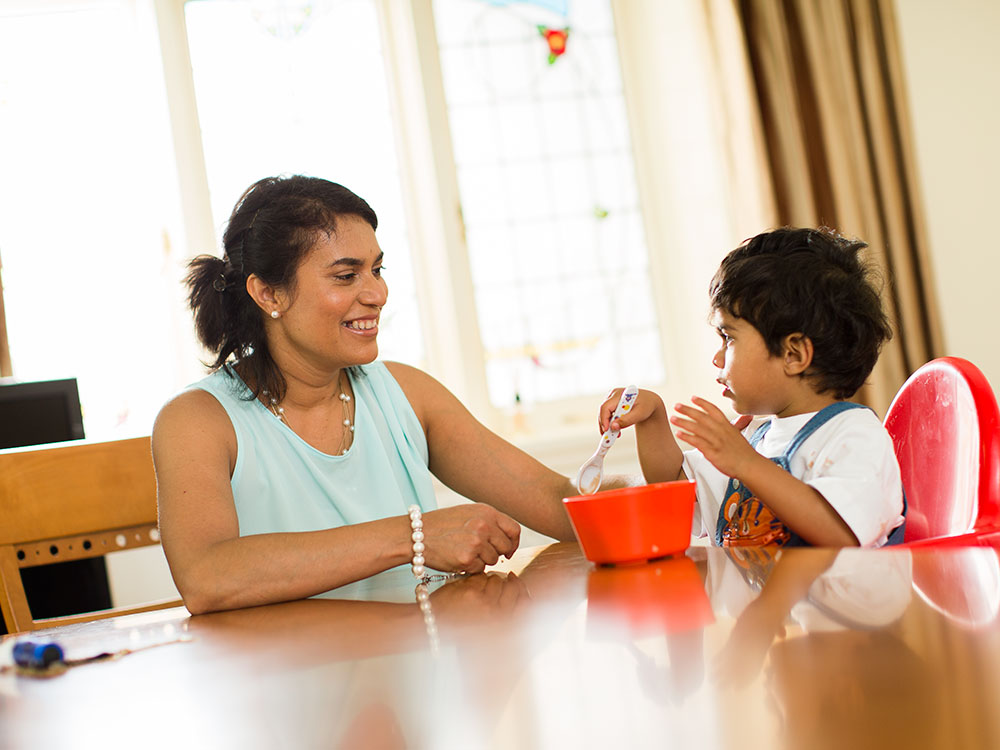Top 5 Effective Toddler Communication Strategies for Parents
When chatting with your little one, remember to practice active listening. Pay attention to what they say and feel, responding with empathy. Use positive reinforcement to praise good behavior and establish routines for predictability. Keep your words simple and clear, using visuals and eye contact. Encourage independence by letting them choose and try new things. These strategies can enhance your communication with your toddler.
Key Takeaways
- Practice active listening to understand your child’s communication cues.
- Use positive reinforcement to encourage desired behaviors effectively.
- Establish consistent routines for predictability and security.
- Communicate using simple language and visual aids for clarity.
- Encourage independence by allowing autonomy and celebrating successes.
Active Listening

To effectively communicate with your toddler, it’s essential to practice active listening, which involves fully focusing on and understanding what your child is trying to convey through both words and nonverbal cues. Pay close attention to your toddler’s body language; it can often speak louder than words. Children may not always have the vocabulary to express their emotions clearly, so observing their gestures and facial expressions is important in deciphering their feelings.
Additionally, mirroring your toddler’s emotions can help them feel understood and supported. When your child is happy, share in their joy by smiling and showing enthusiasm. Conversely, if they’re upset or frustrated, acknowledge their feelings by using a calm and reassuring tone. By reflecting their emotions back to them, you’re validating their experiences and showing empathy.
This simple act can strengthen your bond and foster a deeper level of trust between you and your child. Remember, active listening is a powerful tool in nurturing effective communication with your toddler.
Positive Reinforcement
Utilizing positive reinforcement is a highly effective method in encouraging desired behaviors and fostering a positive parent-child relationship.
Implementing a reward system can motivate your toddler to repeat positive behaviors. When your child engages in a behavior you wish to encourage, such as sharing toys or using polite words, offering a small reward like extra playtime or a sticker can reinforce that behavior.
Encouragement techniques, such as verbal praise or a high-five, can also be powerful tools in behavior modification.
When praising your toddler, be specific about what behavior you’re acknowledging. For example, instead of just saying ‘good job,’ you could say, ‘Great job sharing your toys with your friend!’ This specificity helps your child understand exactly what they did well and increases the likelihood of them repeating that behavior.
Praise techniques should be genuine and immediate to have the greatest impact on your child’s behavior. By consistently using positive reinforcement, you can create a supportive and encouraging environment that nurtures your toddler’s development and strengthens your bond.
Establishing Routines

Establishing routines is key in providing structure and predictability for your toddler’s daily activities and can greatly contribute to their overall development and well-being.
Consistent bedtime habits help your child wind down and prepare for a restful night’s sleep, while mealtime routines create a positive environment for healthy eating habits to form.
Morning schedules set the tone for the day, offering a sense of security and stability.
Playtime rituals not only foster creativity and imagination but also teach children about the importance of balance between work and play.
Using Simple Language

Your toddler learns best when you make sure to use simple language that’s clear, direct, and easy for them to understand. By incorporating visual aids like pictures or gestures, you can enhance their comprehension. Repetition is key in reinforcing their understanding of words and concepts.
When you speak to your toddler, make sure to maintain eye contact and use nonverbal cues like smiling or nodding to keep them engaged and interested in the conversation.
Research shows that toddlers respond well to straightforward language that matches their developmental stage. Avoid using complex sentences or vocabulary that may confuse them. Instead, break down your sentences into short, simple phrases that they can easily grasp.
Engage your toddler in conversations by asking them questions and giving them time to respond. This back-and-forth interaction not only helps improve their language skills but also strengthens your bond with them.
Encouraging Independence

Empower your toddler by providing opportunities for them to make choices and try new tasks independently, fostering their sense of autonomy and self-confidence. Encouraging independence in toddlers is vital for their development. Start by allowing them to engage in self-care activities such as dressing themselves, brushing their teeth, or feeding. These tasks help them build essential life skills and boost their self-esteem.
Moreover, promoting problem-solving skills is key to fostering independence. Encourage your toddler to figure things out on their own by providing them with age-appropriate challenges. For instance, if they’re struggling with a toy, guide them on how to approach the issue but let them come up with solutions themselves. This practice not only enhances their cognitive abilities but also nurtures their sense of accomplishment.
Remember to celebrate their efforts and successes, no matter how small. By offering support and encouragement, you’re laying the foundation for your toddler to become a self-reliant and confident individual.
Frequently Asked Questions
How Can I Handle Temper Tantrums Effectively?
When handling temper tantrums, use positive reinforcement to encourage good behavior. Stay calm and redirect their focus. Set consistent boundaries and practice empathetic listening to understand their feelings. This approach helps foster effective communication with your toddler.
What Do I Do if My Toddler Refuses to Communicate?
When your toddler refuses to communicate, pay attention to their nonverbal cues. Offer gentle guidance, showing patience and understanding. Remember, communication can take many forms, and your support will help them feel comfortable sharing their thoughts and feelings.
Is It Okay to Use Technology for Communication?
Yes, it’s okay to use technology for communication with your toddler. However, set clear boundaries on screen time. Teach digital communication etiquette early on to foster healthy habits. Balance tech use with other forms of interaction for best development.
How Do I Address Aggression in Toddler Communication?
When addressing aggression in toddler communication, focus on dealing with defiance by setting clear boundaries and redirecting negative behavior positively. Consistent discipline, teaching empathy, and modeling appropriate reactions help shape healthy communication skills.
What if My Toddler Shows Signs of Speech Delay?
If your toddler shows signs of speech delay, early intervention is key. Consult a pediatrician for guidance and consider speech therapy. Research shows that early support can greatly improve language development and overall communication skills.
Conclusion
To sum up, by implementing these top 5 effective toddler communication strategies, you’re setting your child up for success in their language development and overall growth.
Active listening, positive reinforcement, establishing routines, using simple language, and encouraging independence are key components in fostering strong communication skills in your little one.
Remember to be patient, consistent, and understanding as you navigate this exciting journey of helping your toddler communicate effectively. Your efforts will surely pay off in the long run.

Chad Adan Kace, a young dad from Vermont, shares his parenting journey with a touch of humor and lots of love. Father to a lively baby, he explores the joys and challenges of fatherhood through his stories.







